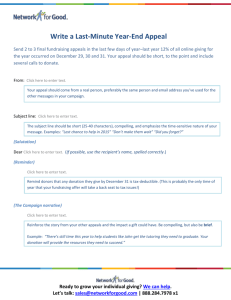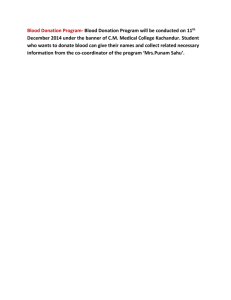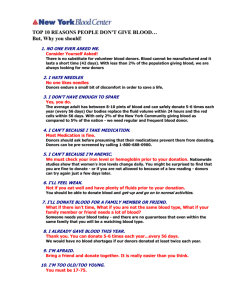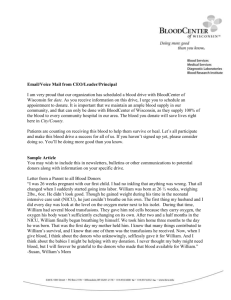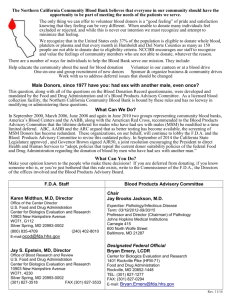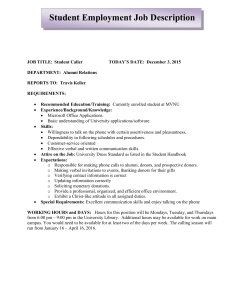speech by yb dato` dr chua soi lek, minister of health malaysia, at the
advertisement
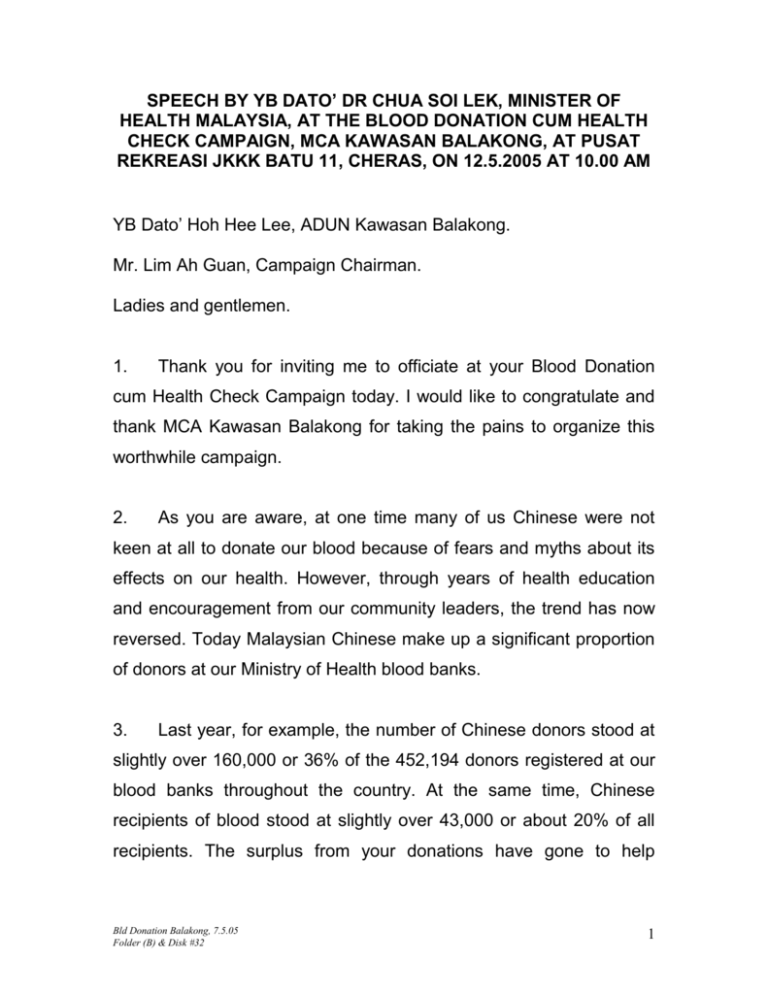
SPEECH BY YB DATO’ DR CHUA SOI LEK, MINISTER OF HEALTH MALAYSIA, AT THE BLOOD DONATION CUM HEALTH CHECK CAMPAIGN, MCA KAWASAN BALAKONG, AT PUSAT REKREASI JKKK BATU 11, CHERAS, ON 12.5.2005 AT 10.00 AM YB Dato’ Hoh Hee Lee, ADUN Kawasan Balakong. Mr. Lim Ah Guan, Campaign Chairman. Ladies and gentlemen. 1. Thank you for inviting me to officiate at your Blood Donation cum Health Check Campaign today. I would like to congratulate and thank MCA Kawasan Balakong for taking the pains to organize this worthwhile campaign. 2. As you are aware, at one time many of us Chinese were not keen at all to donate our blood because of fears and myths about its effects on our health. However, through years of health education and encouragement from our community leaders, the trend has now reversed. Today Malaysian Chinese make up a significant proportion of donors at our Ministry of Health blood banks. 3. Last year, for example, the number of Chinese donors stood at slightly over 160,000 or 36% of the 452,194 donors registered at our blood banks throughout the country. At the same time, Chinese recipients of blood stood at slightly over 43,000 or about 20% of all recipients. The surplus from your donations have gone to help Bld Donation Balakong, 7.5.05 Folder (B) & Disk #32 1 members of the other ethnic groups who needed blood – a truly meritorious act in line with the Malaysian caring spirit. 4. In the Federal Territory alone, 108,821 units of blood were collected last year. Out of these, 84% were collected by our mobile units through blood donation campaigns like this one today, meaning that these campaigns are very important to our blood collection efforts each year. I would like to thank each and everyone of you who have rolled up your sleeves today to donate your precious “gift of life”. 5. Recently, there was some public concern over the safety of our blood supply, resulting from a controversial report in the press. Let me reassure you, the Malaysian public, that we have actually one of the best and safest blood transfusion services in the developing world today. 6. For example, since 1979, i.e. even before the appearance of the AIDS epidemic in the world, we have put in place a policy to recruit voluntary donors instead of replacement donors. Generally, voluntary donors are safer donors and are less likely to be suffering from diseases that may be transmitted by blood. Replacement donors on the other hand are more likely to be donating their blood in return for remuneration, and are generally a more risky group. 7. According to World Health Organization estimates, on average less than 40% of blood donors in developing countries are voluntary donors; but we in Malaysia have already achieved a voluntary donor Bld Donation Balakong, 7.5.05 Folder (B) & Disk #32 2 rate of 99%, which is equivalent to that in developed countries. In fact, last year 9 states registered a 100% voluntary donor rate, i.e. Perlis, Penang, Selangor, N.Sembilan, Melaka, Johor, Pahang, Terengganu and Wilayah Kuala Lumpur. 8. On top of that, we screen all the blood that we collected to make sure that they are free from infections before they are released for use. Each year, less than 2% of the blood collected by our blood banks are found to be tainted with infections like Hepatitis B, Hepatitis C, Syphilis and HIV. These are immediately destroyed and never put into use. Thus, the likelihood of our patients being transfused with tainted blood should not arise, because all blood that failed our stringent screening process are discarded and destroyed. 9. What the Director of the National Blood Centre was trying to say in her statement to the press was that we have noted some people who are known carriers of these diseases going around the blood banks donating their blood. They are misusing the screening services provided by the blood banks to check and counter-check on their infectious status, when they could easily have done so through the services at our outpatient clinics. In doing so, they are actually incurring unnecessary expenses on our blood banks, because it costs us more than RM80 to process 1 unit of blood, including those that have to be ultimately discarded and destroyed. 10. Last year, at the National Blood Centre we discarded and destroyed 976 units of such blood, of which 197 were from such Bld Donation Balakong, 7.5.05 Folder (B) & Disk #32 3 known, infected donors. These were the people we were trying to bring in for counseling. Ladies and gentlemen, 11. Despite our success in developing a safe and dependable blood transfusion service for the country today, a lot remains to be done. For example, the percentage of Malaysians that can donate blood, but don’t, is still sizeable. Fewer than 2 percent of healthy Malaysians actually donate blood each year. Most of the non-donors cite “fear of the needle” and “never thought about it” as their main reasons for not giving blood. 12. Few people realize that we can only keep the blood that we collect for 42 days. And some of the blood components like platelets can only be kept for 5 days. Thus, day in and day out we have to continue with our efforts to collect blood. We need to move away from a culture of “blood donation through appeals” to one where people turn up voluntarily at our blood banks on their own as a social responsibility. Our target is to get at least 5% of the population to donate blood regularly each year – a rate equivalent to that seen in developed countries. We can achieve that with your help and support. 13. On that note, ladies and gentlemen, I have pleasure in opening your Blood Donation cum Health Check Campaign today. Thank you. Bld Donation Balakong, 7.5.05 Folder (B) & Disk #32 4
